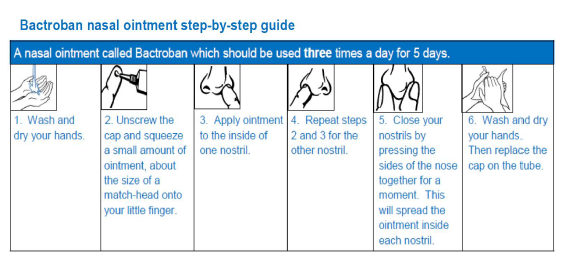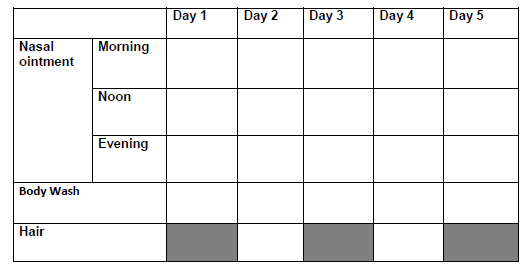MRSA—Positive Result
What is MRSA?
MRSA is a type of bacteria (germ). It stands for Meticillin Resistant Staphylococcus aureus. It is a type of bacteria that has become resistant to all penicillin-like antibiotics. However, MRSA can be treated with other sorts of antibiotics.
What is MRSA screening?
This is a simple test to check whether you carry MRSA on your skin without it causing harm or symptoms, this is also known as being ‘colonised’. Swabs may be taken from several places, such as your nose, groin, and any damaged skin. This is painless and only takes a few seconds. The results will be available within a few days.
When and where will I be screened?
If you are being admitted for an operation, usually you will be screened in pre-assessment clinic or sometimes at your GP surgery. You may also be screened when you are admitted to hospital: either in the Emergency Department or on the ward. The swabs are usually taken at the same time as other checks such as blood pressure and blood tests.
How can I avoid getting MRSA in hospital?
General hygiene:
- Do not share personal items with other patients.
- Avoid touching drips (intravenous devices), wounds or catheters.
- If the area around your bedside is dirty or if bathrooms are dirty, ask for them to be cleaned - do not attempt to do this yourself.
- Don’t be afraid to ask staff if they have washed their hands before they touch you.
- Don’t be afraid to ask staff to clean the equipment they are going to use.
- Ask your visitors to wash their hands before they come onto the ward and when they leave. Ask them not to sit on your bed.
Hand hygiene:
- Always wash your hands with soap and water after using the lavatory/ commode and before and after eating. Ask for help if you need assistance.
- Apply alcohol hand rub (hand sanitiser) or use hand wipes regularly to keep your hands clean.
I’ve been told I carry MRSA, what does this mean?
Do not worry. Many people carry MRSA on their skin or in their nose, it does not make them ill and they are not normally a risk to other people (this includes older people, pregnant women, children and babies).
We all carry bacteria and usually it doesn’t cause a problem. However, when a person with MRSA is admitted to hospital for a procedure that involves breaking the skin, then there is a risk that MRSA may enter the body and cause an infection. If you have MRSA on your skin, you may need topical treatment to remove as much of the bacteria as possible. This is known as suppression therapy or decolonisation therapy.
Treating MRSA reduces the chance of MRSA causing an infection or passing MRSA on to another patient. If you are not already admitted to hospital you will be contacted by the hospital or your GP, who will let you know what you need to do next. They will explain more about the treatment.
If you are swabbed in hospital and are found to be MRSA positive, you may be nursed in an isolation room or with other patients carrying MRSA on their skin. This is to minimise the risk of spreading MRSA to other vulnerable patients. If you are not carrying MRSA you are unlikely to be contacted by the hospital or your GP.
Can I still have my operation?
Yes, in most cases. If you are due to have an operation or procedure you will be asked to commence the 5 day topical treatment for your nose and skin, as described below, 4 days before your planned admission. It is important to follow the instructions in this leaflet to maximise the success of the treatment which will reduce your chance of infection.
What if my operation is urgent?
If your operation is urgent and you must go to hospital quickly, you may be started on the treatment as soon as possible and might be admitted to an isolation room in the hospital.
Can I still have visitors?
Yes. You can still have visitors, including children and pregnant women. You are no risk to them. Visitors do not need to wear gloves and an apron. Always check the guidance on visiting with your nurse. Visitors should always clean their hands with soap and water or alcohol hand rub before and after visiting anyone in hospital.
Going home
If you are otherwise well enough, your going home date will not be delayed even if you are carrying MRSA on your body. MRSA is not a danger to healthy family, friends or the general public so there are no special precautions. Hand washing and general environmental cleanliness is all that is required.
What are the risks associated with using the MRSA treatment?
Most people do not experience problems. If any problems develop, you should stop using the treatment immediately and tell your doctor or nurse.
What is the treatment for MRSA?
The products normally used for topical treatments are:
Nose - Bactroban nasal ointment (Mupirocin 2% which is an antibiotic)
Body –4% Chlorhexidine (which is an antiseptic wash), common brands are Hydrex and Hibiscrub; you may also receive an alternative skin wash called Octenisan Body Wash which can be used in the exact same way instead.
Ideally bed linen and clothing/night wear should be changed daily, washed at 40oC (warm cycle) and ideally tumble dried and ironed when dry.
TOPICAL TREATMENT INSTRUCTIONS:
How do I use the nasal ointment/cream?
The antibiotic nasal ointment comes in a small tube. You need to use it three times a day, for five days.
- Squeeze a small amount of the ointment on to a clean finger.
- Put the ointment on the insides of both of your nostrils.
- Using clean fingers, gently press both nostrils together for a few seconds to thoroughly spread the ointment over the inside of your nose.

How do I use the antiseptic hair and body wash?
The pink-coloured antiseptic wash comes in a bottle and must be used as prescribed.
You should use it as both a soap and a shampoo for a shower, bath or wash every day for five days. Avoid getting it in your eyes or ears.
- Wet your skin.
- Put some of the antiseptic wash on a clean, damp flannel and use it to thoroughly clean your whole body, working downwards.
- Make sure you wash your skin for at least one-three minutes, in particular your face, nose, armpits and groin.
- Rinse off with clean water.
- Wash your hair on day two and four with the antiseptic wash and rinse off thoroughly after application.
- Do not share the bottle with anyone else. Ask for a new bottle if you run out.
- Do not use it with other shampoos, soaps or moisturisers.
Topical treatment of the nose and body is for 5 days in total. You or your carer can record the applications in the table below

Concerns and Compliments
Chelsea & Westminster Hospital NHS Foundation includes Chelsea and Westminster and West Middlesex University Hospitals as well as services provided at a range of other sites.
We strive to deliver high standards of care within Chelsea and Westminster NHS Foundation Trust. Sometimes things can go wrong but we will try to put things right for you as quickly as possible, and prevent it happening again.
We value your opinion and encourage you to provide us with feedback.
Chelsea and Westminster Hospital
369 Fulham Road, London SW10 9NH
Patient Advice and Liaison Service (PALS)
E: chelwest.cwpals@nhs.net T: 0203 315 6727
West Middlesex University Hospital
Twickenham Road, Isleworth, Middlesex TW7 6AF
Patient Advice and Liaison Service (PALS)
E: chelwest.wmpals@nhs.net T: 0208 321 6261
If you have any other questions or concerns, please talk to your doctor or nurse. Alternatively, you can contact the Infection Prevention and Control Team on:
West Middlesex: 020 8321 5785
Chelsea and Westminster: 020 3315 8266

